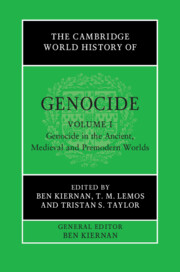Book contents
- The Cambridge World History of Genocide
- The Cambridge World History of Genocide
- The Cambridge World History of Genocide
- Copyright page
- Contents
- Figures
- Maps
- Tables
- Contributors to Volume I
- General Editor’s Acknowledgements
- General Editor’s Introduction to the Series
- Introduction to Volume I
- Part I Themes of Genocide through History
- Part II The Ancient World
- 6 Genocide in Ancient Israelite and Early Jewish Sources
- 7 Genocide in Ancient Mesopotamia during the Bronze and Iron Ages
- 8 Urbicide in the Ancient Greek World, 480–330 bce
- 9 Violence, Emotions and Justice in the Hellenistic Period
- 10 A Tale of Three Cities
- 11 Caesar’s Gallic Genocide
- 12 Genocidal Perspectives in the Roman Empire’s Approach towards the Jews
- 13 Religious Violence in the Later Roman Empire
- 14 Genocide, Extermination and Mass Killing in Chinese History
- Part III The Medieval World and Early Imperial Expansions
- Index
9 - Violence, Emotions and Justice in the Hellenistic Period
from Part II - The Ancient World
Published online by Cambridge University Press: 23 June 2023
- The Cambridge World History of Genocide
- The Cambridge World History of Genocide
- The Cambridge World History of Genocide
- Copyright page
- Contents
- Figures
- Maps
- Tables
- Contributors to Volume I
- General Editor’s Acknowledgements
- General Editor’s Introduction to the Series
- Introduction to Volume I
- Part I Themes of Genocide through History
- Part II The Ancient World
- 6 Genocide in Ancient Israelite and Early Jewish Sources
- 7 Genocide in Ancient Mesopotamia during the Bronze and Iron Ages
- 8 Urbicide in the Ancient Greek World, 480–330 bce
- 9 Violence, Emotions and Justice in the Hellenistic Period
- 10 A Tale of Three Cities
- 11 Caesar’s Gallic Genocide
- 12 Genocidal Perspectives in the Roman Empire’s Approach towards the Jews
- 13 Religious Violence in the Later Roman Empire
- 14 Genocide, Extermination and Mass Killing in Chinese History
- Part III The Medieval World and Early Imperial Expansions
- Index
Summary
This chapter explores key episodes of extreme violence in the context of wars between Greek-speaking groups in the Hellenistic period. Case studies explore the phenomenon of destruction of Hellenistic cities and interrogate whether such destruction in warfare should be counted as genocide. The chapter identifies and compares conditions for extreme violence in the Hellenistic period, which was marked by continual warfare. It argues that competing discourses about justice, together with different emotional regimes related to justice, including anger, pity, and shame, serve both to moderate and intensify violence throughout this period. Where violence is taken to be just, views of justice as legitimate punishment and vengeance can ground acts of extreme violence, while view of justice as reasonable, equitable and gentle may moderate violence but could also be activated to justify extreme violence, if it is taken to be responding to extraordinary provocations or ethical and religious violations. These traditions of justice and emotional norms in the context of warfare in turn sit within a range of other cultural and political commitments which may both moderate and provoke extreme violence, including the development and maintenance of civic identity, legal and religious norms, and considerations of economic and political power.
Keywords
- Type
- Chapter
- Information
- The Cambridge World History of Genocide , pp. 257 - 277Publisher: Cambridge University PressPrint publication year: 2023

